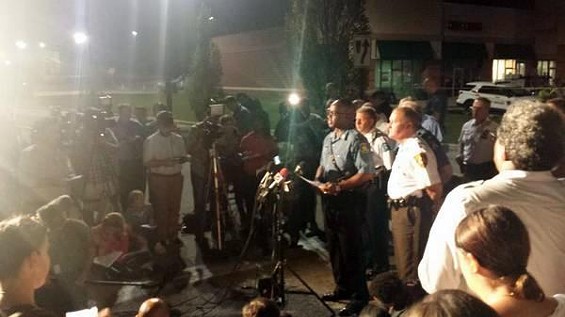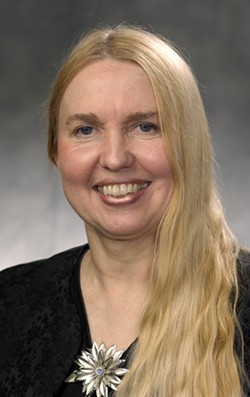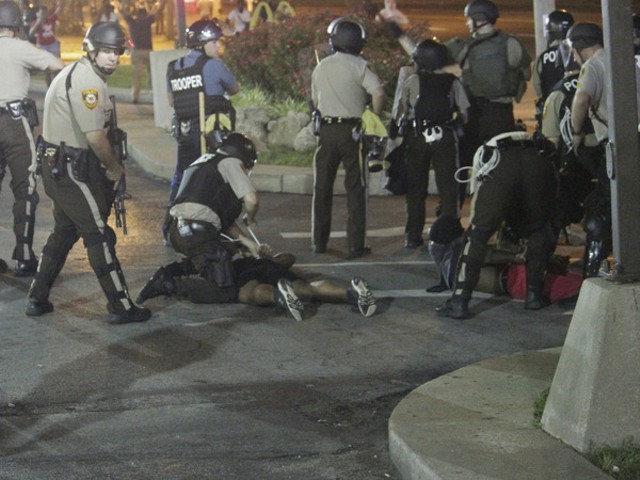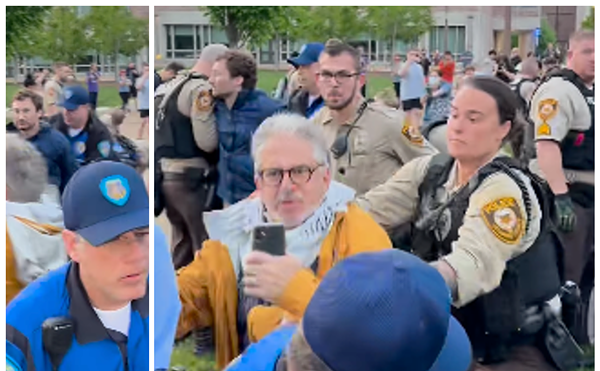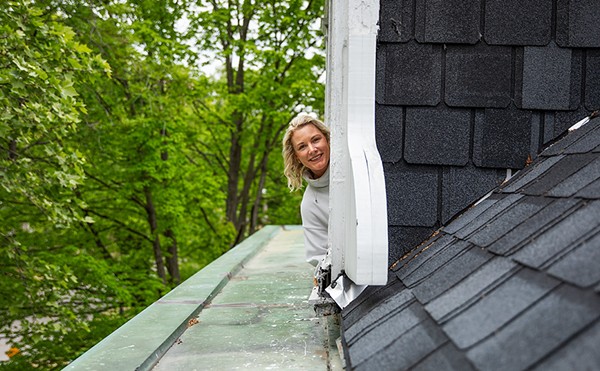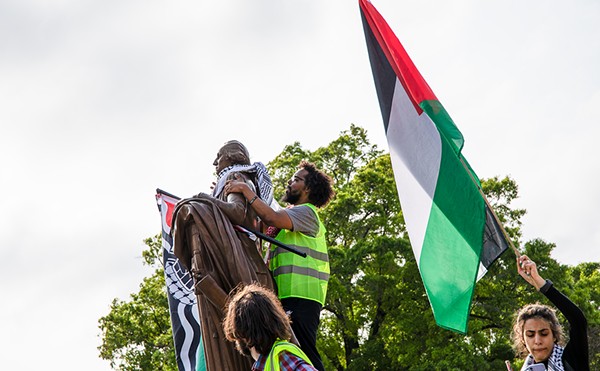At the end of another dangerous night in Ferguson, Missouri State Highway Patrol Captain Ron Johnson offered an emotional plea to the media on Monday: Please stop putting officers in danger and glamorizing violent agitators in your quest for Internet virality.
Johnson seemed near tears as he illustrated the danger the press face in Ferguson -- earlier that night, reporters disobeyed police orders and fled the media corral to take pictures of a car parked across the street before officers could secure two guns. Johnson said police suspect the occupants of the car opened fire at the Canfield Green Apartments that night.
Journalists defied Johnson's plea, and it's easy to understand why they're even more distrusting than usual. Any journalist covering Ferguson at night has likely been tear gassed, if not hit by debris, rubber bullets, pepper pellets or bean bags. Police have threatened to shoot, mace and arrest reporters, sometimes on live TV or feeds. Officers have detained reporters from the Washington Post, Huffington Post, Getty Images and more, releasing them later without answers.
See also: Watch Police in Ferguson Arrest, Tear Gas Journalists [VIDEO]
"Yes, we may take some of you into custody," Johnson told press on Monday. "But when we do take you into custody and we have found out you're a journalist, we've taken the proper action. But in the midst of it, we cannot...in the midst of it, in the midst of chaos and trying to move people on, we have to be safe. We have to be safe."
With the eyes of the world upon them, members the international press corps covering Ferguson have become their own story, sometimes because they're treated roughly and sometimes because it seems they're heightening, not just recording, the tension. From a Los Angeles Times reporter quoting an MSNBC reporter:.@trymainelee says, and I agree, that media has become an accelerant at this point.
— Matt Pearce (@mattdpearce) August 20, 2014Media voices amplify across Twitter as reporters point to their fear, bulletproof jackets and wounds as proof: If this happens to us, imagine how Ferguson police treat regular ol' folks.
Seasoned reporters, bloggers, podcasters, activists with popular Twitter feeds, students, hobbyist photographers -- all are converging on this St. Louis suburb, often outnumbering protesters to tell what's become the most important domestic news story of the year at a time when peace feels impossible for this St. Louis suburb.
And police can't keep up, Johnson said.
"I'm going to tell you, in the midst of chaos, when officers are running around, we're not sure who is a journalist and who's not," he said. "Some journalists are walking around, and all you have is a cell phone because you're from a small media outlet. Some of you may just have a camera around your neck."
In a life-and-death situation, like when armed rioters are firing at police from the apartments behind the emblematic, burned-out QuikTrip in Ferguson, how can police tell once and for all who is a journalist and who isn't? Who is protected by the First Amendment's freedom of the press, and who is not?
That question is almost impossible to answer, and with good reason, says Sandra Davidson, a professor of journalism law at the University of Missouri School of Journalism.
"If anybody says they have easy answer, don't believe them," she tells Daily RFT. "We don't license journalists in this country, and that is very deliberate."
See all Riverfront Times coverage of Michael Brown and Ferguson.
The U.S. has struggled with the issue of distinguishing journalists from non-journalists since 1972, when the U.S. Supreme Court declined to give reporters a pass from testifying about illegal activities they witness while reporting.
"If you grant any privilege [to a journalist], then you have to follow up with a definition of who is a journalist," Davidson says. "The Supreme Court was not willing to do so."
Now fast-forward to 2014, when anyone with an Internet connection and a smartphone can grow an audience by sharing instant updates or live feeds from Ferguson.
"So who gives out the credentials? Who decides?" says Davidson. "That's a rather uncomfortable concept.... Now you get into a real sticky situation."
The answer, she says, is that there is no official answer.
"I don't think there are any absolutes when you start asking questions of safety and questions of the precise demarcation between a person's rights and the government's rights. There is little precision when you have situations that are potentially explosive," she says. "This is a situation where it's case by case, or situation by situation. I think [Johnson] is saying, under these special circumstances, this is the way it is. You remove people from the scene, and then you check later."
That's a hard answer for journalists to swallow, especially after they've been ziptied and detained. Even President Barack Obama has come out against the arrests, saying reporters should not be detained for doing their jobs.
"It's alarming for journalists," Davidson admits.
Once press obtain acceptable credentials, police have a special duty to inform and protect them -- something Johnson said his officers can't do if media don't follow orders to clear dangerous areas.
"It's a war there, and some of the journalists are saying they felt safer in Afghanistan than here," Davidson says. "Journalists do want to perform the watchdog function, but you can't perform the watchdog function if you're dead."
With police facing more touch-and-go, volatile nights of violence, looting and riots in Ferguson, Davidson has no advice, but plenty of sympathy, for reporters and officers alike.
"Police, journalists -- nobody knows exactly what is going to happen from moment to moment, and without knowing what precisely is going to happen, it's hard to say precisely what anybody should do," she says. "A lot of these people, police and journalists, are in what for them is uncharted territory."
That's a scary thing, especially for those in Ferguson facing the violence without the shield of a badge or press pass. That's something that's kept Washington Post reporter Wesley Lowery up at night:
For safety, I moved backward. As I did, a girl in her late teens/early 20s grabbed my arm...
— Wesley Lowery (@WesleyLowery) August 19, 2014"Are you leaving? Please don't leave. PLEASE! What if they shoot us? You have to be here to tell people" she told me & a photog
— Wesley Lowery (@WesleyLowery) August 19, 2014On several nights that's been expressed to me: the desperate desire from residents who assume police will kill them for media to document
— Wesley Lowery (@WesleyLowery) August 19, 2014The fear and desperation in their voices is something I can't shake. Keeps me up, pacing, at night. Replaying in my head
— Wesley Lowery (@WesleyLowery) August 19, 2014
